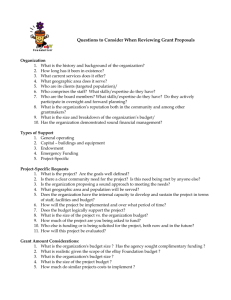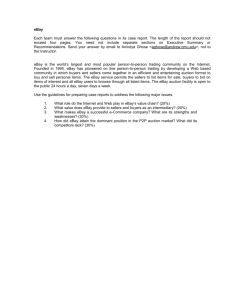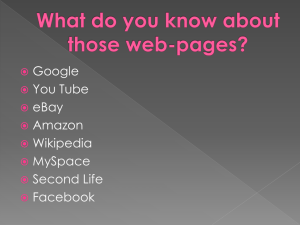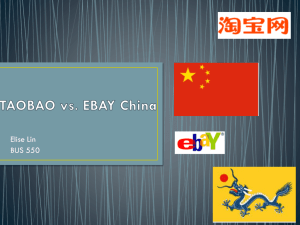Taobao vs. EBay China
advertisement
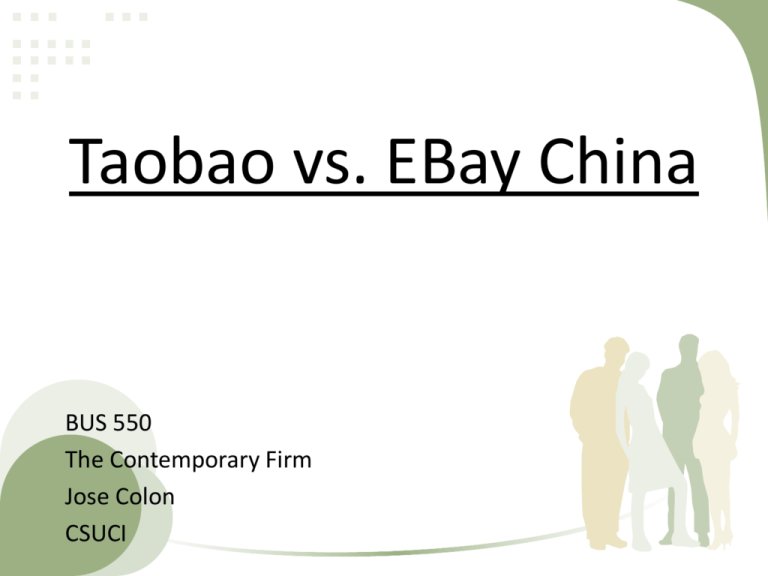
Taobao vs. EBay China BUS 550 The Contemporary Firm Jose Colon CSUCI Agenda • • • • • • The Beginning of China’s Online C2C Market The Rise of EachNet.com EBay in China Alibaba’s Taobao EBay's Exit from China Questions Online C2C Market in the Early 2000’s China United States • Low internet penetration • Lacked regulation for online exchanges • People are not afraid of being sued • Issuing banks did not accept c.c. from other cities • Undeveloped Credit System • Credit Cards accounted for 1% of consumer spending • High internet penetration • Online exchanges regulated with contracts • People are afraid of being sued • Credit Card were accepted throughout the nation • Developed Credit System • Credit Cards accounted for 25% of consumer spending Addressing its Shortcomings China: • Began accepting online credit card applications • Established credit verification companies • Created a single card processing system for all banks (2002) Results: • Internet usage increased from 14 million (1995) to 490 million (2002) users; in 2008, usage reached 1.6 billion users • Online shopping increased; the volume of C2C transactions increased from $56 million (2001) to $7.3 billion (2007) EachNet.com Background: • Founded in 1999 as an online auction house • 2001: held 90% of China’s online C2C market Challenges faced by the company: • Users reluctant to complete transactions online- in person • Transactions were concentrated in a few large cities • China lacked an efficient delivery system • Needed to find a way to earn revenue Solutions EachNet.com: • Trading Booths- workshops; demonstrated how to complete transactions online, create user accounts and upload pictures • Established a cash-on-delivery system (U.S.- COD) • Partnered with large banks to encourage credit card usage • In order to address and minimize online fraud, the company: 1) made it difficult to artificially inflate ratings 2) investigated cases of reported fraud 3) required ID verification when creating a new account • Raise capital by charging listing fees and commissions EBay in China Background: • Founded in 1995 and went public in 1998 • Global leader in online C2C services • 1999: the company began to expand outside of the U.S. • 2001: expanded operations into 17 markets around the world • 2002: exited Japan’s market and acquired Eachnet.com which was then fully integrated into eBay’s global platform • EachNet.com’s acquisition enabled eBay to enter China CEO Meg Whitman: “China can be eBay’s largest market on a global basis… We want to do everything we can to maintain our No. 1 position.” Alibaba Background • 1999: founded as a B2B website • 2002: leading B2B website in China • 2003: recognized eBay’s acquisition of EachNet.com as being a serious threat to its market share and launched Taobao Problem to solution: • Alibaba would use Taobao as C2C website to compete with eBay and to address a small business market that lacked the distinction between businesses and consumers How Taobao Crushed EBay • Aligned itself with the two the companies responsible for kicking eBay out of Japan: Softbank Capital and Yahoo! • Rather than using heavy marketing and exclusive contracts, the company took a grassroots approach and utilized bulletin board services (BBS) online • For the first five years, the website’s services were free • Struck deals with leading logistic companies in China EBay Being Crushed Cont. Competitive Advantage: “A Sense Of Community” • Encourage online interaction- full contact information such as phones numbers and personal web pages • Categorize goods to reflect Chinese Department Stores • Established long-term, secure relationships with government officials and cooperation with banking industry leaders AliPay: Taobao’s version of PayPal (PayPal was rejected) • Escrow services- held buyer’s money during transactions • Provided insurance for buyer’s in case of fraud Nail in the Coffin • AliPay was made available to merchants not using the website • Partnered with China’s MSN shopping channel and one of China’s leading portal websites, Sohu • Only operated in the Chinese market to avoid fierce legislation • More flexible and faster in responding to customer complaints • 2008: to generate revenue and further crush eBay, the company launched Tmall.com as an online B2C market • 2007: eBay exited China’s market • 2013: China’s largest e-commerce website • 2014: 78% of China’s market share by revenue- $9.8 billion Questions • Cultural capital is the wealth of knowledge than an individual has for a specific culture or set of cultures. Can cultural capital be considered a competitive advantage for businesses? • In terms of global uniformity, did eBay impose too much of its culture versus adapting to China’s culture? • Where eBay failed, Taobao prevailed. How important is it to have longstanding and secure relationships with individuals that can potentially affect your business? Multiple Choice 1. a. b. c. d. What two companies crushed eBay in Japan? Softbank Capital Yahoo! a and b None of the above 2. What did AliPay offer to buyers? a. Escrow services b. Logistic services c. Fraud insurance d. a and c Multiple Choice Cont. 3. Taobao’s “sense of community” does not focus on which of the following: a. Encourage online interaction b. Provide poor customer service c. Categorize goods to reflect Chinese department stores d. Establishing longstanding and secure relationships with government officials and cooperation from with banking industry leaders Works Cited • http://www.marxists.org/reference/subject/philosophy/works/fr/bourdie u-forms-capital.htm • https://forum.lowyat.net/topic/2216660/all • http://www.shanghaiexpat.com/phpbbforum/taobao-and-foreign-creditcards-t142068.html • http://august-weisholz.blogspot.com/2010/09/analysis-of-2008-strategicadjustments.html • http://www.chinainternetwatch.com/7493/mobile-shopping-2014q1/ • http://en.wikipedia.org/wiki/Taobao • https://gsbapps.stanford.edu/cases/documents/ib88.pdf
